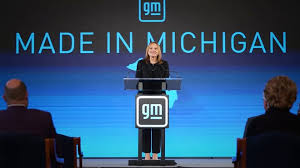General Motors has decided to relinquish its stake in the Ultium Cells battery plant in Lansing. The decision was confirmed on Monday by GM, which announced plans to sell back its investment in the plant to its joint venture partner, LG Energy Solution. This move aligns with GM CEO Mary Barra's recent statements about the company's strategic shift towards more cautious capital allocation to ensure production capacity matches demand.
In addition to selling its stake in the Lansing facility, GM disclosed an extension of its 14-year partnership with LG to include the development of prismatic cell technology. Currently, Ultium Cells, the joint venture between GM and LG, specializes in pouch battery cells. However, the new partnership will focus on prismatic cells, which offer benefits such as increased energy storage capacity, reduced vehicle weight, and lower production costs due to their simpler manufacturing process.
Kurt Kelty, GM's vice president of battery cell and pack, emphasized the company's commitment to enhancing EV performance, safety, and cost-efficiency through battery technology advancements. By expanding their collaboration with LG Energy Solution, GM aims to accelerate progress towards these objectives.
The decision to divest from the Lansing plant stems from GM's confidence in its existing joint-venture battery cell plants in Warren, Ohio, and Spring Hill, Tennessee. These facilities supply cells for popular electric vehicle models like the Chevrolet Silverado EV, GMC Sierra EV, Cadillac Lyriq, and others in GM's growing EV lineup. GM's Chief Financial Officer, Paul Jacobson, expressed optimism about the company's EV profitability, attributing much of the success to the strategic partnership with LG Energy Solution.
While GM will no longer own a stake in the Ultium Cells Lansing facility, LG Energy Solution plans to utilize the plant's capacity for producing battery cells for another undisclosed automaker's EVs. The timeline for the plant's operational launch under this new arrangement remains undisclosed, but LG Energy is expected to reimburse GM for its initial investment, estimated to be around $1 billion.
The Ultium Cells Lansing plant, initially projected to create 1,700 jobs upon full operation, currently employs close to 100 individuals. Despite this change in ownership, LG Energy reportedly intends to honor the job creation commitment when the facility commences production. This strategic shift in ownership aligns with LG Energy Solution's broader objective of optimizing investments in North America to meet the evolving needs of global automakers.
GM's foray into prismatic cell technology represents a pivotal step in diversifying its battery supply chain and enhancing the performance of future EVs. The company plans to leverage the expertise of LG Energy Solution in prismatic cell production and capitalize on their extensive patent portfolio in battery design and manufacturing technology. The partnership's focus on developing innovative cell technologies underscores GM's dedication to staying at the forefront of the electric vehicle market.
In conclusion, GM's decision to sell back its stake in the Ultium Cells Lansing battery plant marks a strategic realignment aimed at streamlining production capabilities and strengthening partnerships in the rapidly evolving EV landscape. By prioritizing innovation and efficiency in battery technology, GM positions itself for sustained growth and competitiveness in the burgeoning electric vehicle market.

